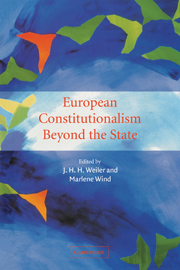Book contents
- Frontmatter
- Contents
- Notes on contributors
- Introduction: European constitutionalism beyond the state
- Part I
- Part II
- 2 Postnational constitutionalism and the problem of translation
- 3 The unfinished constitution of the European Union: principles, processes and culture
- 4 Europe and the constitution: what if this is as good as it gets?
- 5 The European Union as a polycentric polity: returning to a neo-medieval Europe?
- Part III
- Epilogue: europe and the dream of reason
- Index
4 - Europe and the constitution: what if this is as good as it gets?
Published online by Cambridge University Press: 26 June 2009
- Frontmatter
- Contents
- Notes on contributors
- Introduction: European constitutionalism beyond the state
- Part I
- Part II
- 2 Postnational constitutionalism and the problem of translation
- 3 The unfinished constitution of the European Union: principles, processes and culture
- 4 Europe and the constitution: what if this is as good as it gets?
- 5 The European Union as a polycentric polity: returning to a neo-medieval Europe?
- Part III
- Epilogue: europe and the dream of reason
- Index
Summary
Introduction
In Alice in Wonderland there is a moment when Alice gets to an intersection between two roads. At the top of a tree she sees a Cheshire cat and asks him: ‘Which road should I take?’ The cat answers: ‘That depends on where you want to go.’ As always in the works of Lewis Carroll, the answer is so logical as to be obvious but frequently forgotten. Constitutional lawyers are the cats of European integration. There are limits to what cats and lawyers can do. The central theme of this chapter is about knowing those limits as a starting point to provide meaningful normative proposals for European constitutionalism.
In this chapter, I argue that national constitutionalism is simply a contextual representation of constitutionalism whose dated and artificial borders are challenged by European constitutionalism. In themselves, constitutional ideals are not dependent on nor legitimized by the borders of national polities. As a consequence, there is often no a priori claim of higher validity for national constitutionalism vis-à-vis European constitutionalism. My first objective is to question the artificial supremacy of national constitutionalism and argue for a new form of constitutionalism. At the same time, I believe it will be possible to derive from a new analysis of constitutionalism a form of legitimation for the European Union arising from its constitutional and democratic added value in facing the present atomization and de-territorialization of normative power. The deconstruction of constitutionalism required by European integration may actually promote an extended application of its ideals.
- Type
- Chapter
- Information
- European Constitutionalism beyond the State , pp. 74 - 102Publisher: Cambridge University PressPrint publication year: 2003
- 16
- Cited by



